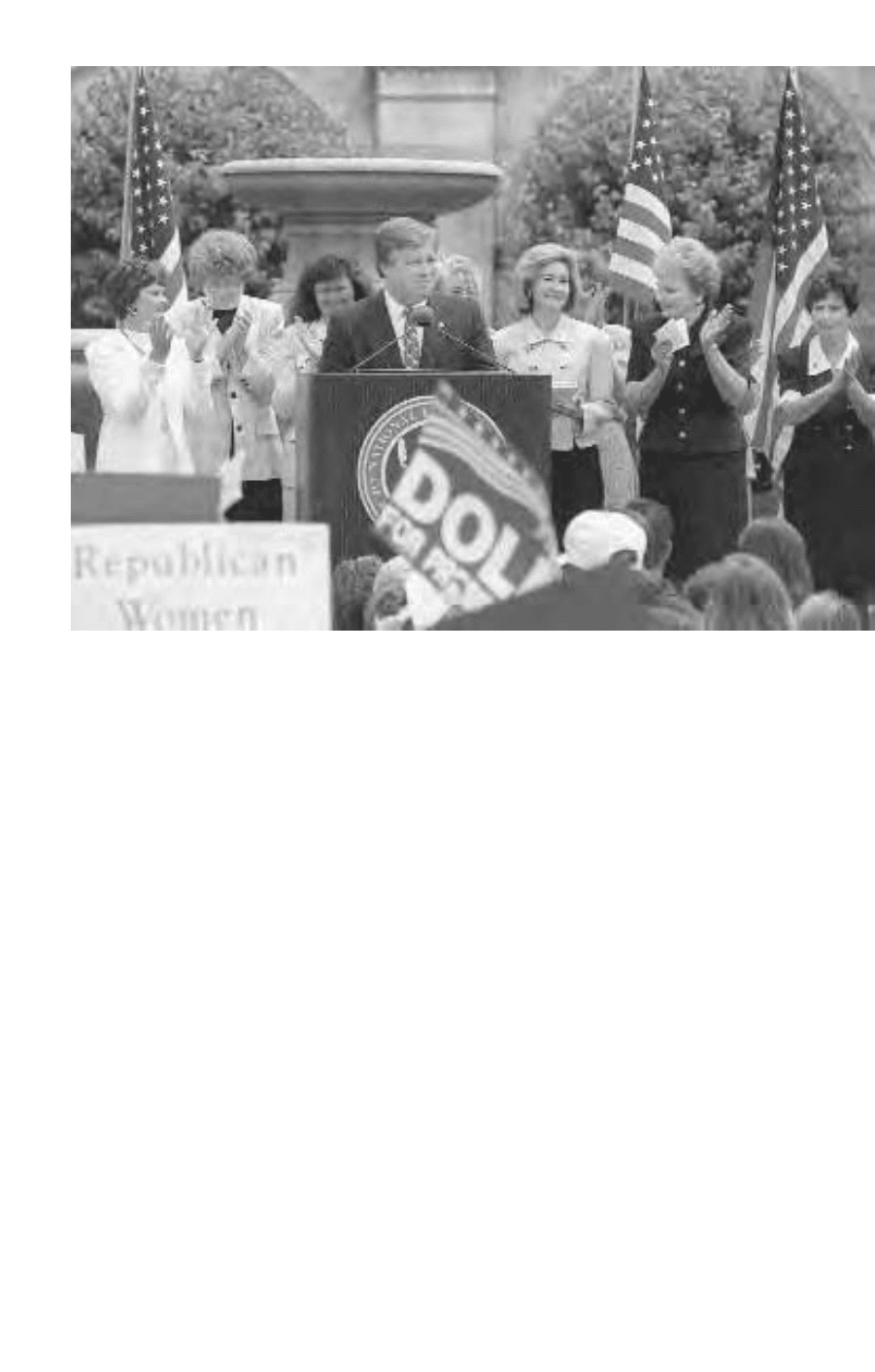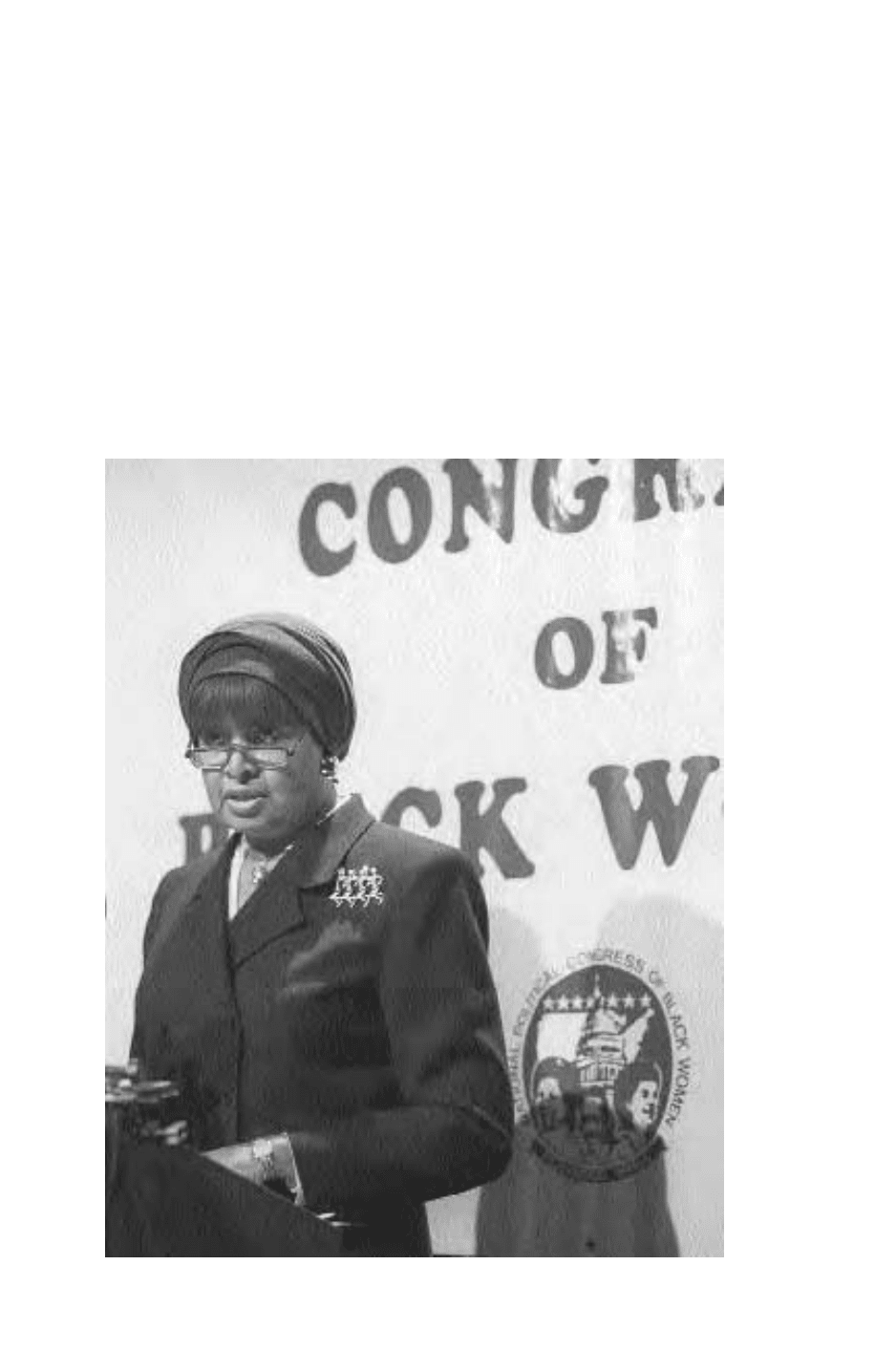Schenken Suzanne O’Dea. From Suffrage to the Senate: An Encyclopedia of American Women in Politics (2 Volumes)
Подождите немного. Документ загружается.


women. In 1920, NCJW joined the Women’s Joint Congressional Com-
mittee and helped pass the Sheppard-Towner Maternity and Infancy Pro-
tection Act of 1921 and the Cable Acts, among other measures. NCJW
supported civil rights legislation, beginning with the antilynching bill in
1938; continuing through the Civil Rights Acts of 1957, 1964, and 1985;
and placing particular emphasis on the Voting Rights Act of 1965. The or-
ganization supports the Equal Rights Amendment, reproductive rights, an
end to domestic violence, and development of safe, affordable, quality
child day care.
See also Abortion; Cable Acts; Civil Rights Act of 1964, Title VII; Domestic
Violence; Equal Rights Amendment; Protective Legislation; Sheppard-Towner
Maternity and Infancy Protection Act of 1921; Voting Rights Act of 1965;
Women’s Joint Congressional Committee
References Rogow, Gone to Another Meeting: The National Council of Jewish
Women, 1893–1993 (1993); www.ncjw.org.
National Council of Negro Women
Founded in 1935 by Mary McLeod Bethune, the National Council of Ne-
gro Women (NCNW) was the first national coalition of black women’s or-
ganizations. The National Association of Colored Women (NACW),
founded in 1896, had brought together women’s clubs and national asso-
ciations of women’s clubs, and the NCNW created an umbrella organiza-
tion that included the NACW, African American women’s college-based
professional sororities, and other professional, religious, and political or-
ganizations. NCNW’s mission is “to advance opportunities and the qual-
ity of life for African American women, their families and communities,”
and it seeks to “extend the collective power and leadership of African
American women.”
When she organized NCNW, Bethune believed that bringing black
women’s organizations together would “harness the great power of nearly
a million women into a force for constructive action.” After serving as
president of the National Association of Colored Women from 1924 to
1928, Bethune was convinced that a national coalition of women’s groups
was needed to gain the full representation of African American women in
national public affairs. By bringing national African American women’s
organizations together, Bethune believed that coordination of the organi-
zations’ efforts would reduce duplication among them and increase their
effectiveness.
Ending segregation and other forms of racism has been an NCNW
priority since its beginning. In the 1940s, the organization exposed dis-
criminatory practices that excluded African Americans from government
training programs and employment opportunities at plants producing
National Council of Negro Women 479

materials for World War II. NCNW worked for the admission of black
women into the women’s divisions of the Army, Navy, and Air Force, and
Bethune recruited many of the first black women to join the Women’s
Army Corps. Through NCNW’s advocacy, African American women
gained positions in the War Manpower Commission, the Women’s and
Children’s Bureaus, the Department of Labor, and other federal agencies.
By the end of Bethune’s tenure as president of NCNW in 1949, the or-
ganization was recognized as the major advocate for black women.
Another African American woman with strong leadership ability,
Dorothy Irene Height, became president in 1957. Height had served
NCNW in several posts and brought a strong understanding of the issues
before the organization, particularly the emerging civil rights movement.
In the 1960s, NCNW worked with the Student Nonviolent Coordinating
Committee on voter registration projects by sending volunteers, money,
and other resources. In 1965, NCNW recruited northern white female
professionals to work in Freedom Schools that offered classes in voting
and other related areas.
Under Height’s leadership, NCNW focused attention on youth, em-
ployment opportunities, housing, health, hunger, civil rights, women’s is-
sues, family issues, and related areas. With a grant from the U.S. Agency for
International Development, NCNW established an international division
to work with women in Africa, the Caribbean, and other areas of the world.
NCNW dedicated the Mary McLeod Bethune Memorial in 1974, the first
monument to an African American or to a woman of any race on public
land in Washington, D.C., and the Mary McLeod Bethune Museum and
National Archives for Black Women’s History was also dedicated in 1974.
In 1986, Height began the Black Family Reunion celebrations, annual
cultural events that focus on the strengths and values of the African Amer-
ican family. The Black Family Reunion Cookbook was published in 1992,
the first of three volumes that document the diversity and heritage of
African American cuisine.
The Dorothy I. Height Leadership Institute held its first programs in
1997. The institute provides three kinds of leadership training—for affil-
iate organizations’ members, community volunteers, and college students.
The fourth component of the institute is the African American Women’s
Critical Issues Research and Development, a think-tank approach to de-
veloping positions on current issues and the subsequent dissemination of
the information to members and affiliates.
NCNW’s membership includes thirty-seven affiliated national or-
ganizations, 250 community groups in forty-two states, and 45,000 indi-
viduals. The national affiliates include sororities, professional associa-
tions, and civic and social clubs.
480 National Council of Negro Women

See also Alpha Kappa Alpha Sorority; Baker, Ella Josephine; Bethune, Mary
Jane McLeod; Civil Rights Movement, Women in the; Height, Dorothy Irene;
National Association of Colored Women; Tubman, Harriet
References Fitzgerald, The National Council of Negro Women (1985); Hine, Black
Women in America (1993); www.ncnw.com.
National Federation of Afro-American Women
Formed in 1895, the National Federation of Afro-American Women
(NFAAW) was organized “to teach an ignorant and suspicious world that
our [black women’s] aims are identical with those of all good aspiring
women.” African American leader Josephine Ruffin wrote those words as
part of her call to create a group to counter a journalist’s assertion that
black women were “prostitutes, thieves, and liars.” Ruffin called on African
American women to work together to teach the world the truth. Twenty
clubs founded the NFAAW, a number that grew to thirty-six clubs from
twelve states. NFAAW merged with the Colored Women’s League in 1896
to form the National Association of Colored Women.
See also Colored Women’s League; National Association of Colored Women
References Hine and Thompson, A Shining Thread of Hope: The History of Black
Women in America (1998).
National Federation of Republican Women
Founded in 1938, the National Federation of Republican Women
(NFRW) is the largest women’s partisan organization in the United States,
with more than 115,000 members in 2,100 local groups based in every
state, the District of Columbia, Puerto Rico, and the Virgin Islands.
NFRW members work to elect Republicans to every level of public office
through educational programs, fund-raising efforts, and volunteer work.
Republican women had begun forming local groups in the 1870s to
support the party’s efforts, particularly in election years. Often, these
groups organized on an ad hoc basis and dissolved after the election. Hun-
dreds of clubs existed by the late 1930s; Indiana, for example, had more
than 100 Republican women’s organizations. Some of the groups caused
Republican Party leaders concern because they tried to establish party pol-
icy, endorsed candidates in the primary elections, or worked for Demo-
cratic candidates. In addition, by the 1930s the Democratic Party had de-
veloped a national network of women volunteers and held firm majorities
in Congress; a majority of the nation’s governors were Democrats; and
Democratic President Franklin D. Roosevelt was in the White House.
Party leaders decided that they could impose discipline on the
groups, coordinate their programs, and utilize the volunteer resources by
National Federation of Republican Women 481

bringing them together under an umbrella. In 1938, Republican National
Committee (RNC) assistant chairperson and director of women’s activi-
ties Marion E. Martin called a meeting to unite the groups into a national
organization. Eleven states joined as charter members, representing
eighty-five clubs and 95,000 members. Martin became executive director
of NFRW and developed political education programs, organized affili-
ates, and provided leadership. By 1940, NFRW had 350,000 members.
At the 1967 NFRW biennial convention, a controversy developed over
the election of the group’s leadership. Generally, the organization’s vice
president is elected president for the next two-year term. Phyllis Schlafly
had held the vice presidency for the 1965–1967 term, but some NFRW and
Republican Party leaders believed that she was too conservative for the
good of the party and influenced the nominating committee to endorse
NFRW board member Gladys O’Donnell and leave Schlafly off the ballot.
Amid charges of unfair voting procedures, O’Donnell won the presidency.
Outraged, Schlafly called for the creation of a conservative women’s orga-
nization and launched the Phyllis Schlafly Report, a monthly newsletter.
NFRW seeks to advance the power of women through political access
and participation and to develop leaders for the future. NFRW’s current
programs include recruiting women candidates for local and state office,
lobbying, training women in campaign management, and organizing
leadership development seminars.
482 National Federation of Republican Women
The National
Federation of
Republican Women
sponsored a get-out-
the-vote rally (left to
right): Representative
Sue Myrick (R-NC);
Senator Sheila Frahm
(R-KS); Representa-
tive Enid Greene
(R-UT); Republican
National Committee
chair Haley Barbour
(at the podium);
Senator Kay Bailey
Hutchison (R-TX);
Marilyn Thayer,
president of the feder-
ation; and Represen-
tative Constance
Morella (R-MD),
1996 (Associated
Press AP)

See also Eagle Forum; Martin, Marion E.; National League of Republican
Colored Women; Republican Party, Women in the; Schlafly, Phyllis Stewart
References Rymph, “Marion Martin and the Problem of Republican Feminism”
(1996); Williams, comp., The History of the Founding and Development of the
National Federation of Republican Women (1963); www.nfrw.org.
National Gender Balance Project USA
Founded in 1988, the National Gender Balance Project USA (NGBP)
works to increase the number of women serving on state boards and com-
missions by passing legislation requiring governors to appoint women to
the positions. In 1988, Iowa became the first state in the nation to require
gender balance on all state boards and commissions, committees, and
councils. Iowa feminist Kappie Spencer founded NGBP to encourage
replication of Iowa’s law in other states. By bringing the concept to the at-
tention of other feminist groups, NGBP has enlisted the support of sev-
eral groups, including the American Association of University Women,
the Women’s Agenda Conference, the National Association of Commis-
sions for Women, and the National Women’s Political Caucus. Several
states have adopted variations of Iowa’s law, with Florida expanding it to
include ethnic representation. NGBP argues that attaining gender balance
better utilizes women’s talents and provides a broader perspective for de-
veloping policy. In addition, serving on policymaking bodies provides a
route to elective office for women and men.
See also American Association of University Women; National Association of
Commissions for Women; National Women’s Political Caucus
National League of Republican Colored Women
The National League of Republican Colored Women (NLRCW) devel-
oped from the National Association of Colored Women (NACW) in 1924,
when Republican national committeewomen Mamie Williams of Georgia
and Mary Booze of Mississippi united black women’s Republican clubs.
Among the group’s officers was treasurer Mary Church Terrell, the first
president of NACW. With the slogan “We are in politics to stay and we
shall be a stay in politics,” the group worked to gain African American
women’s support for the Republican ticket in the 1924 elections.
In 1928, NLRCW president Nannie Burroughs of Washington, D.C.,
was appointed to the Republican National Committee’s Speakers Bureau
and was a popular and sought-after speaker. The group celebrated Re-
publican presidential candidate Herbert Hoover’s success, and several
NLRCW members went to Washington for his inauguration. When they
arrived, however, Burroughs was asked to retrieve inauguration tickets
National League of Republican Colored Women 483

accidentally sent to the African American women who had worked in the
campaign. In addition, the inaugural ball was segregated.
Over the next four years, an accumulation of racial offenses and the
Hoover administration’s inaction on civil rights prompted many African
American women to leave the Republican Party and give their allegiance
to the Democratic Party. By 1932, the NLRCW had dissolved.
See also National Federation of Republican Women; Republican Party, Women
in the; Terrell, Mary Eliza Church
References Higginbotham, “In Politics to Stay: Black Women Leaders and Party
Politics in the 1920s” (1990).
National Organization for Women
Founded in 1966, the National Organization for Women (NOW) has
250,000 members and 450 chapters, making it the largest organization of
feminist activists in the United States. NOW was founded out of frustra-
tion with the Equal Employment Opportunity Commission’s (EEOC) re-
sistance to enforcing the prohibitions against sex discrimination in Title
VII of the Civil Rights Act of 1964. Feminist leaders Betty Friedan, Pauli
Murray, EEOC commissioner Aileen Hernandez, Catherine East, and oth-
ers concluded that a civil rights organization for women was needed to
advocate for women’s concerns. Their idea was to create a group for
women comparable to the National Association for the Advancement of
Colored People. Twenty-eight women each contributed $5, and NOW was
born. The founders stated NOW’s purpose as follows: “To take action to
bring women into full participation in the mainstream of American soci-
ety now, assuming all the privileges and responsibilities thereof in truly
equal partnership with men.” NOW’s first action was sending a telegram
to the EEOC, urging the commissioners to end sex-segregated help-
wanted newspaper ads. Challenging the EEOC was a primary focus of
NOW’s efforts for several years.
In late October 1966, an organizing conference elected Friedan pres-
ident, Karen Clarenbach chair of the board, and Hernandez executive vice
president. In 1967, task forces on women in poverty, legal and political
rights, equal opportunity in employment, the image of women in mass
media, and other groups gathered information and stated NOW’s posi-
tion on the issues. NOW’s first priorities included federal aid for child care
centers and full income tax deductions for child care services. In addition
that year, support for the Equal Rights Amendment (ERA) and the repeal
of all abortion laws became and continue to be the group’s most publi-
cized, most ardently supported, and most controversial issues.
Support for the ERA had a divisive effect on NOW. Several of its
leaders and followers came from organized labor, particularly the United
484 National Organization for Women

Auto Workers (UAW). In 1967, UAW opposed the ERA, and although the
UAW members active in NOW supported the amendment, they felt that
they had to withdraw from NOW when the organization endorsed it. Two
years later, after the UAW decided to support the ERA, women UAW
members rejoined NOW and resumed their active participation.
NOW’s support for the repeal of abortion laws also caused division.
Some feminists who supported the Equal Rights Amendment believed
that adding abortion to the organization’s agenda made it unnecessarily
controversial and held the potential for alienating feminists who did not
want abortion decriminalized. In 1968, one of NOW’s founding members
left and organized the Women’s Equity Action League. Despite the con-
troversy, NOW continued its work for reproductive rights by organizing
clinic defense, lobbying Congress for the Freedom of Access to Clinic En-
trances Act, and winning a major lawsuit against Operation Rescue under
the Racketeer Influenced and Corrupt Organizations (RICO) statute.
Attracting and effectively using press attention were among the lead-
ership’s greatest strengths. Members picketed men-only restaurants,
demonstrated on Mother’s Day for “Rights, Not Roses,” and protested laws
against abortion. NOW initiated and largely organized the Women’s Strike
for Equality on 26 August 1970, an event that included demonstrations in
more than ninety major cities in forty-two states and involved more than
100,000 women nationwide. In another demonstration supporting child
care tax deductions, a baby carriage brigade included signs asking: “Are
children as important as martinis?” referring to the tax deductions allowed
for business entertaining. Other examples of NOW-sponsored marches
include the 1978 march for the Equal Rights Amendment, which drew
more than 100,000 people to Washington, D.C., and the March for
Women’s Lives in 1992, which drew 750,000 abortion rights supporters to
Washington, D.C., the largest protest ever in the nation’s capital.
Through the NOW Legal Defense and Education Fund (LDEF),
founded in 1970, NOW also gained publicity for the lawsuits it filed. For
example, in 1970 NOW filed a sex discrimination complaint under Exec-
utive Order 11375 against 1,300 corporations that had failed to file affir-
mative action plans for hiring women. Beginning in 1971, NOW protested
the discriminatory practices of AT&T in hiring, promotions, fringe bene-
fits, and executive appointments. In the agreement reached between the
Department of Labor, EEOC, and AT&T, the corporation agreed to a
lump-sum payment of $15 million to 15,000 workers, wage adjustments,
and new hiring practices, including giving more women craft jobs and
broadened management opportunities. In the 1990s, NOW LDEF won
major settlements in sex discrimination lawsuits against the Mitsubishi
Corporation and Smith-Barney.
National Organization for Women 485

In addition to its controversial stands on abortion and equal rights,
NOW added a third issue: lesbianism as a concern of feminism. Initially,
Friedan had rejected including lesbian issues in NOW’s agenda and had re-
ferred to lesbians as the “lavender menace.” At its 1971 convention, however,
NOW passed a resolution stating that lesbianism was a concern of feminism.
After congressional approval of the Equal Rights Amendment in
1972, NOW committed much of its resources to its ratification. The early
successes of the amendment in 1972—twenty-two states ratified that
year—lulled some leaders into believing that the amendment would eas-
ily be ratified by the necessary thirty-eight states. After Phyllis Schlafly or-
ganized Stop ERA in 1973 and defeated ratification attempts in several
states, it became clear that a more organized and better-funded effort
would be required for ratification. In 1978, NOW announced a boycott of
unratified states, an effort that other organizations joined. NOW helped
extend the ratification deadline and intensified its efforts, but the amend-
ment failed in 1982.
Although the ERA consumed many of the organization’s resources for
several years and remains one of the organization’s platforms, it continued
to support and develop other issues related to obtaining women’s equality.
NOW works to end sexual harassment and sexual and physical violence
against women, elect feminists to public office, end racism, protect abor-
tion rights and reproductive freedom, and secure civil rights for lesbians.
See also Abortion; Affirmative Action; Civil Rights Act of 1964, Title VII; Equal
Employment Opportunity Commission; Equal Rights Amendment; Feminist
Movement; Friedan, Betty Naomi Goldstein; Hernandez, Aileen Clarke;
Murray, Pauli; National Association for the Advancement of Colored People,
Women in the; NOW v. Scheidler; Suffrage; Women’s Equity Action League
References Carabillo, Meuli, and Csida, Feminist Chronicles 1953–1993 (1993);
Freeman, The Politics of Women’s Liberation (1975); www.now.org.
National Organization of Black Elected Legislative Women
Founded in 1985, the National Organization of Black Elected Legislative
Women (NOBEL) trains African American women to prepare them for
elective and appointive office. Founded by former state legislator Diane
Watson, NOBEL works to increase the number of African American
women serving at every level of government by sponsoring forums and
other educational programs. NOBEL focuses on public policy issues, pro-
motes black women’s participation in the development of public policy,
and develops policy proposals.
NOBEL has lobbied for programs to help black youth, pressed for the
rights of political refugees in South Africa, and sponsored a symposium
on the black community and diseases affecting women.
486 National Organization of Black Elected Legislative Women

See also National Political Congress of Black Women; National Women’s
Political Caucus
References Hine, ed., Black Women in America (1993).
National Political Congress of Black Women
Founded in 1984, the National Political Congress of Black Women
(NPCBW) provides a political forum for African American women.
Shirley Chisholm, the first black woman to run for president of the United
States and a former member of Congress, founded the organization to en-
courage African American women to become active in elective politics.
Educating women about all levels of the political process and bringing
black women into political leadership are the goals of the organization.
NPCBW has identified and recommended African American women for
National Political Congress of Black Women 487
C. Delores Tucker,
chair of the National
Political Congress of
Black Women, spoke
out against gangsta
rap at the National
Press Club in
Washington, D.C.,
1995 (Associated
Press AP)

appointment to high-level policy positions within President Bill Clinton’s
administration, contributing to the greater number of African American
women serving in his administration than in any previous administration.
NPCBW has worked for affirmative action, access to nontraditional
jobs, economic development, housing and urban development, and other
issues. Through its hearings on housing market discrimination against
African Americans, it has prompted legislative action. NPCBW continues
to work on job discrimination, health care, drug abuse, single parenting,
education, and the availability of child day care.
See also Chisholm, Shirley Anita St. Hill
References www.npcbw.org.
National Right to Life Committee
Founded in 1973 by the Roman Catholic Church, the National Right to
Life Committee (NRLC) later became a nonsectarian group. The largest
prolife organization in the United States, NRLC was organized after the
1973 U.S. Supreme Court decision in Roe v. Wade legalized abortions.
NRLC coordinates lobbying efforts at the state and federal levels, involves
its membership in letter-writing campaigns and other forms of citizen ad-
vocacy to enact restrictions on abortions and to end legal abortions, and
employs professional lobbyists.
NRLC has supported a human life amendment to declare the per-
sonhood of the fetus from the moment of conception. Although NRLC
and other prolife groups have not succeeded in passing the amendment,
they have helped to pass restrictive laws in most states, including measures
that required parental notification before a minor could obtain an abor-
tion and mandatory waiting periods.
See also Abortion
References Blanchard, The Anti-Abortion Movement and the Rise of the Religious
Right: From Polite to Fiery Protest (1994).
National Welfare Rights Organization
Founded in 1967, the National Welfare Rights Organization (NWRO) ed-
ucated welfare recipients about their rights and lobbied Congress. In the
1960s, the presence of poverty in the midst of affluence led President Lyn-
don Johnson to discuss the possibility of eliminating poverty in the
United States. As Congress passed several antipoverty measures, welfare
recipients created networks to educate themselves and others about the
programs and their rights within them.
Initially, local groups used protest strategies such as occupying wel-
fare offices and demanding resolution to their grievances. Later, NWRO
488 National Right to Life Committee
